March 21 is World Down Syndrome Day. Some celebrated by wearing “wacky” socks as a conversation starter. Some performed random acts of kindness, leaving behind little calling cards describing the purpose of WDSD. Others participated in the Day in the Life campaign, an ongoing project collecting stories about life with Down syndrome, preferably in the words, pictures, or other media of the person with Ds themselves. These are all worthy activities, each fulfilling a different goal but all speaking to the great love we have for the people with Down syndrome in our lives.
I watched my Facebook feed fill up with cherubic smiles and triumphant stories describing the “more alike than different” aspect of Down syndrome. A few people passed around several blog posts touching on the idea that WDSD should reflect the full spectrum of Down syndrome, and not just those who attend college, drive cars, get married.
I watched all this unfold, watched the Day in the Life project grow, and felt silent. Stifled. I spent the day wondering where I fit into the parenting community, and where Rowenna fits in the circle of her peers with Down syndrome.
I felt much the same way I’ve felt since Rowenna started to veer off the “more alike than different” path, but a new feeling crystallized: I felt sad. A community that works so hard to make sure our children are included felt like a place we didn’t belong at all.
The Ds parenting community spends a lot of time, energy, and precious resources on the diagnosis conversation. New support groups and websites pop up. Dozens of memoirs have been published describing the familiar roller coaster of emotions many of us ride before life evens out. Lots of blog posts have been written about the new prenatal tests and the ethical implications surrounding them.
The overwhelming chorus is that families new to a diagnosis needn’t worry a bit about Down syndrome. See? Our lives are more alike than different. See? Our children go to college, have jobs, get married. See? They walk and talk and potty train.
We frame the entire diagnosis conversation in ability. We have this incredible opportunity to frame the discussion as “your love for your child is going to outweigh any fears you have” and “your love for your child is transformative – and whether or not she talks does not remain the most important thing about her.” Love grows big and bold and full. Love takes your hope and makes it bigger than your worry. And while the love aspect is part of the conversation, a lot of it is focused on those individuals who do achieve that “more alike than different” ideal.
Where does that leave kids like Rowenna? Is her story invalid because 30 hours a week of intensive, in-home therapy isn’t what most 4 year olds are doing? Is her story invalid because most of her peers with Down syndrome do talk? Is her story invalid because we purposely chose not to put her in a 100% inclusive educational environment?
I’ve been mulling this over for months now as therapy consumes our lives and we work every day to help Rowenna navigate an increasingly complicated world. What do I share about Rowenna’s world, how do I frame it? Is what I have to say going to scare people about Down syndrome if they’re expecting a 4 year old with just a “little” delay?
Last week, Rowenna uttered her first sentence. She said “I want ball,” and I was so overwhelmed by the deep joy and pride I felt in that moment that I wanted to blog about it, but stopped to wonder why that moment when my blog has been silent for so long. I’m not proud to admit that it was partly because she was doing something I thought would shed positive light on the dual diagnosis. I’m not proud of how I’ve kept Rowenna’s experience from the world for fear of how it would be received.
So my reflection on WDSD came to this conclusion: I will share what happens in our lives without fear. I will still share only what I think Rowenna would want people to know, and maintain a small amount of privacy for my family, but I think it’s time to shed some more light on Rowenna’s life.
If I want my daughter’s story as part of the larger Down syndrome chorus, it needs to be shared. I can no longer sit back and wonder why no one talks about the full spectrum of experience if I’m not willing to share a bit myself. I hope that by doing so I will start to see Rowenna’s story reflected in the lives of others, and to shed more light on the idea that ability doesn’t matter a bit. Our shared humanity is what makes us more alike than different, not whether or not we attend college.
Rowenna is beautiful. Luminous. Tender. Curious. Goofy. Loving. Kind. These are the things I cherish about her. The fact that she spoke a sentence is mere icing on that cake. She is part of the Down syndrome family, and her story needs to be heard.

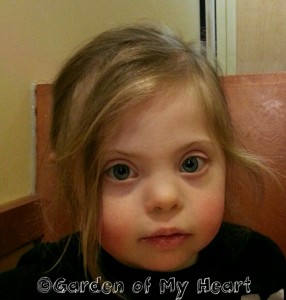
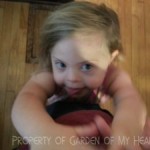

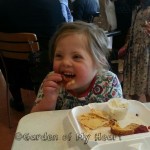
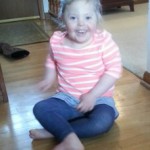
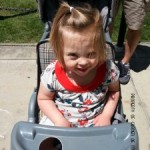

8 Responses to “I Want Ball” – A WDSD Reflection